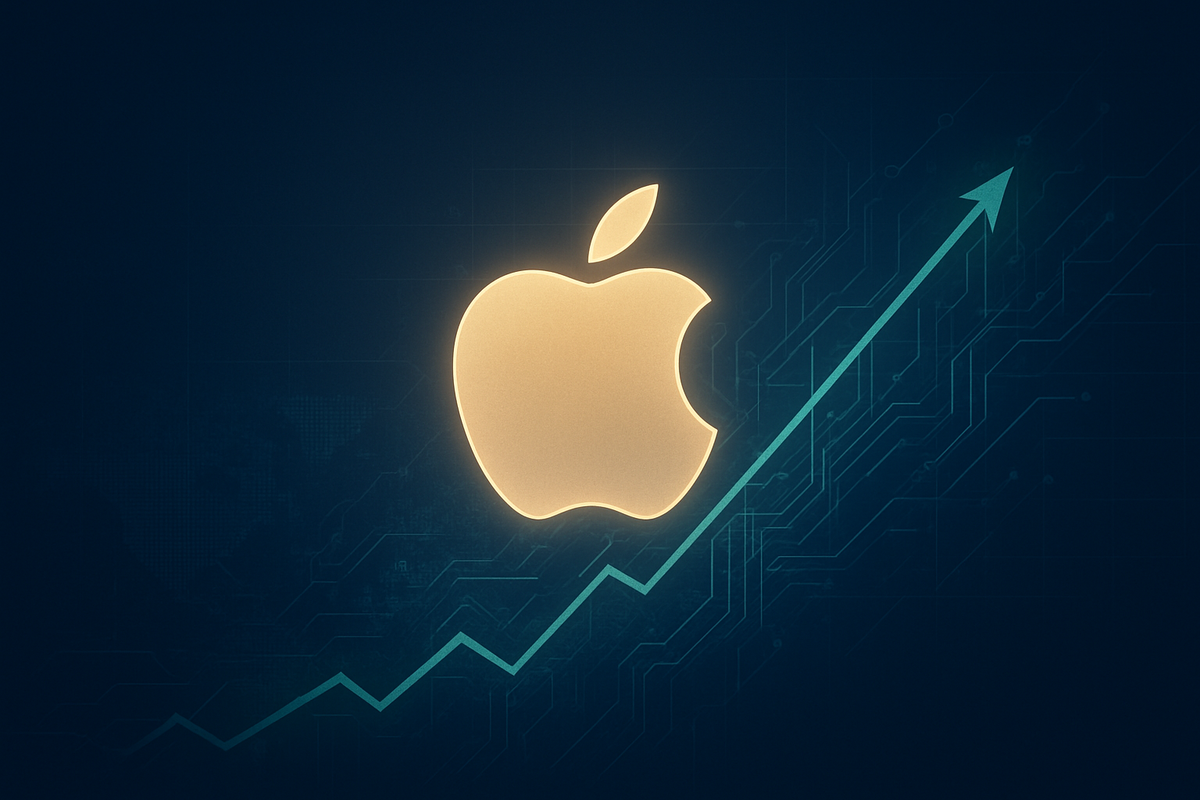
Cupertino, CA – October 29, 2025 – Apple Inc. (NASDAQ: AAPL) finds itself in a remarkably strong market position as of late October 2025, buoyed by robust iPhone 17 sales, an anticipated rollout of its Apple Intelligence features, and ongoing strategic supply chain diversification. This positive momentum is occurring against the backdrop of a surging Nasdaq Composite, which has repeatedly hit all-time highs, underscoring a broad bullish sentiment in the tech sector. Apple briefly achieved a historic $4 trillion market capitalization on October 28, 2025, reflecting significant investor confidence and a testament to its enduring market power.
The market's current enthusiasm for technology stocks, particularly those demonstrating innovation in artificial intelligence and resilient product demand, has provided a fertile ground for Apple's recent performance. While specific daily trading figures for October 29, 2025, remain dynamic, the context of a higher Nasdaq suggests that Apple is likely benefiting from this positive investor sentiment, with its shares reflecting the broader optimism pervading the tech landscape.
Detailed Coverage: Navigating Innovation and Geopolitics
Apple's current market narrative is shaped by several critical developments. The newly launched iPhone 17 lineup is proving to be a significant success, outperforming its predecessor, the iPhone 16 series, by 14% in the first 10 days of availability across the crucial U.S. and China markets. The standard iPhone 17 model has been a major sales driver, particularly in China, where consumers have responded positively to its value proposition. In the U.S., the iPhone 17 Pro Max is seeing strong demand, boosted by enhanced carrier subsidy plans. This strong iPhone cycle is expected to significantly contribute to Apple's Q4 fiscal 2025 results, demonstrating the company's continued ability to drive consumer upgrades in a seemingly mature smartphone market.
Beyond hardware, the ongoing rollout and adoption of Apple Intelligence are keenly watched by investors. Apple aims to integrate AI seamlessly across 100% of its product lines by the end of Q4 2025, leveraging a privacy-first, on-device processing approach. While some analysts have noted a perceived lag in Apple's AI strategy compared to competitors, the company's deliberate approach, coupled with strategic partnerships (including potential integration of Google's (NASDAQ: GOOGL) Gemini AI and an existing collaboration with OpenAI for ChatGPT), aims to offer users the "best of multiple AI models" within its secure environment. The successful integration of these AI capabilities is viewed as a critical determinant for Apple's long-term growth and a potential driver for a new "supercycle" of iPhone upgrades.
Simultaneously, Apple continues its aggressive strategic efforts to diversify its manufacturing footprint away from a heavy reliance on China. Increasing investments in India and Vietnam are designed to mitigate geopolitical risks, reduce tariff impacts, and ensure supply stability. In the first half of 2025, Apple assembled 23.9 million iPhones in India, a 53% increase over the previous year, with India becoming a key production hub for US-bound iPhones. Vietnam is also seeing expanded production for various Apple products, including the Vision Pro headset, AirPods, iPads, HomePods, and Apple Watch. This "China Plus One" strategy aims to build resilience and insulation against future disruptions, though it also introduces complexities and short-term costs in establishing new ecosystems.
Companies in Focus: Winners and Challengers
Apple's current trajectory creates a ripple effect across its ecosystem of competitors and suppliers.
For Apple (NASDAQ: AAPL) itself, the strong iPhone 17 sales are a clear win, driving revenue and solidifying its premium market dominance. The growth of its Services division, projected to surpass $100 billion in annual revenue for the first time in 2025, further strengthens its high-margin revenue streams. However, Apple faces challenges in its perceived pace of AI innovation compared to rivals and navigating complex geopolitical risks in its supply chain, which could incur short-term costs and operational frictions.
Direct competitors face intensified pressure. Samsung (KRX: 005930), a perennial rival in the smartphone market, saw Apple surpass it in global smartphone sales in Q1 2025. While Samsung benefits from overall positive tech sentiment and is aggressively integrating AI into its devices, it needs to differentiate its premium offerings to regain market share. Google (NASDAQ: GOOGL), particularly in its services and AI segments, faces direct competition from Apple Intelligence. Apple's rumored plans for its own AI-powered web search tool, "World Knowledge Answers," pose a direct threat to Google's core search business on iOS devices. However, Google remains a leader in AI advancements and could potentially partner with Apple for Siri enhancements.
Key suppliers like Foxconn (TWSE: 2317) benefit significantly from robust iPhone 17 sales, translating into increased orders and revenue. Foxconn also reported record revenue in Q2 2025, largely driven by strong demand for AI products in its cloud and networking division, showcasing a strategic diversification beyond iPhone assembly. However, Apple's supply chain diversification away from China presents a complex challenge for Foxconn, requiring substantial investments in new regions like India and navigating geopolitical pressures from China seeking to retain its manufacturing dominance.
Wider Significance: Reshaping the Tech Landscape
Apple's current strategic moves are deeply embedded within broader industry trends, reshaping the global tech landscape. The company's strong iPhone 17 sales reinforce the resilience of the premium smartphone market, demonstrating that consumers are willing to pay for advanced features and brand loyalty, even amidst economic uncertainties. This also underpins the growth of Apple's high-margin services business, which thrives on a large, active user base.
The push into AI with Apple Intelligence, despite initial rollout challenges, signifies Apple's commitment to the "AI Gold Rush." Its privacy-first, on-device AI approach offers a potential differentiator in a market increasingly concerned with data security, potentially influencing how competitors design and deploy their AI solutions. This move also positions Apple as a "gatekeeper of AI on mobile devices," impacting how third-party AI developers integrate with its ecosystem. However, the need for regulatory approval for Apple Intelligence features, particularly in China, highlights the complexities of global AI deployment and the increasing scrutiny of AI development by regulatory bodies.
Apple's aggressive supply chain diversification is a leading example of the broader industry trend of "de-risking" from China. Geopolitical tensions, rising tariffs, and the imperative for supply chain resilience are driving multinationals to adopt "China+1" manufacturing strategies. This shift, while incurring short-term costs and complexities, enhances Apple's long-term operational resilience and predictability. The ripple effects extend to other manufacturers and logistics providers, who may follow Apple's lead, further fragmenting global supply chains and boosting manufacturing hubs in countries like India and Vietnam. Historically, tech giants like IBM, Microsoft, and Apple itself have navigated transformative shifts by adapting core competencies and leveraging ecosystem advantages, and Apple's current moves reflect a similar strategic adaptation to evolving market and geopolitical realities.
What Comes Next: Opportunities, Challenges, and Pivots
The coming months and years hold both significant opportunities and challenges for Apple. In the short term, the strong iPhone 17 sales are expected to drive robust revenue and profit growth. The continued integration of Apple Intelligence is anticipated to trigger an "AI-driven upgrade super cycle" for iPhones, Macs, and iPads, as users seek enhanced AI features. This will be a major opportunity for Apple to reinforce its ecosystem. The services segment is also poised for continued expansion, further solidifying its high-margin revenue.
However, Apple faces strategic pivots. It needs to deepen its AI capabilities and find clearer monetization strategies for Apple Intelligence beyond just driving hardware sales, especially given the aggressive AI investments by competitors. Expanding successfully into new product categories like AI-augmented eyewear, robotics, and smart home systems will be crucial for long-term growth beyond the iPhone. Navigating increasing regulatory scrutiny, including antitrust lawsuits in the U.S. and challenges to the Digital Markets Act (DMA) in the EU, will be critical, as these could impact its App Store business model and profitability.
Long-term, Apple's prospects remain resilient, with analysts projecting continued stock growth driven by an AI-enhanced ecosystem, further services expansion, and innovation in wearables and new categories like the Vision Pro 2. The strategic diversification of its supply chain will enhance resilience against geopolitical risks. Potential scenarios range from a bullish AI-driven ecosystem expansion, where Apple achieves or surpasses a $5 trillion market capitalization, to a more challenged outcome if its AI strategy is perceived as too slow or if regulatory headwinds significantly impact its business model.
Wrap-Up: A Titan in Transition
Apple's current market standing, characterized by strong iPhone 17 sales and a burgeoning AI strategy amidst a buoyant Nasdaq, underscores its enduring position as a global technology leader. The brief achievement of a $4 trillion market capitalization is a testament to the market's confidence in its premium brand, robust ecosystem, and consistent innovation. The strong performance of the iPhone 17 suggests that concerns about smartphone market saturation might have been overblown for companies that continue to offer compelling value and innovation.
Moving forward, the tech market will continue to be defined by the "AI Gold Rush," and Apple's success will largely depend on the effective integration and monetization of its "Apple Intelligence" strategy. The company's deliberate, privacy-focused approach to AI, combined with strategic partnerships, aims to differentiate it in a crowded and rapidly evolving landscape. Simultaneously, the ongoing diversification of its supply chain is crucial for long-term operational resilience and navigating an increasingly complex geopolitical environment.
Investors should closely monitor Apple's upcoming Q4 fiscal 2025 earnings report, focusing on sustained iPhone 17 sales momentum, updates on Apple Intelligence rollout and its impact on revenue, continued growth in the Services segment, and any further developments regarding supply chain diversification and geopolitical risks. While Apple's valuations appear somewhat stretched, its strong product pipeline, consistent execution, and proactive strategic pivots position it well for continued growth in the dynamic technology landscape. The coming months will be pivotal in demonstrating how effectively Apple can translate its current momentum into sustained long-term leadership.
This content is intended for informational purposes only and is not financial advice




